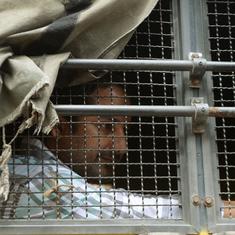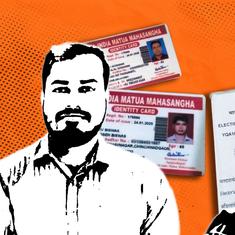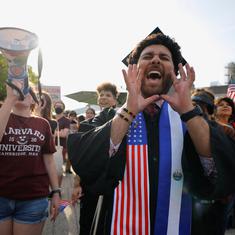BR Ambedkar (1891-1956) was the first Dalit to be formally educated to the highest level, gaining his PhDs from the Columbia University and London School of Economics in 1927 and 1932, respectively. He was also the first Indian to pursue a doctorate in economics abroad.
Despite building an international reputation as a lawyer, Ambedkar waged a singular and lonely battle for years against India’s Brahminical and higher-caste political establishment. This included Mahatma Gandhi, who resisted Ambedkar’s effort to formalise and codify a separate identity for “lower-caste” Hindus. Nonetheless, Ambedkar became Law Minister in the first government of independent India, and chairman of the committee which drafted the Indian Constitution. In the final stages of his life, Ambedkar distanced himself from politics and converted to Buddhism in 1956, shortly before he died.
He was posthumously awarded the Bharat Ratna, India’s highest civilian award, in 1990.
Here are fourteen books (including two for young readers) about the people’s leader who revolutionised Indian politics in order to ensure dignity for some of the poorest and worst oppressed sections of the country’s population.
Dr Ambedkar and Untouchability: Analysing and Fighting Caste, Christophe Jaffrelot
Jaffrelot’s book focuses on the three key areas that are central to a full understanding of India’s pioneering Dalit: Ambedkar as a social theorist; Ambedkar as a statesman and politician; and Ambedkar as an opponent of caste Hinduism and advocate of Buddhism as a method of release from Hindu social oppression. In each case, Jaffrelot argues, Ambedkar was the first to forge new political, symbolic, and emotively powerful strategies for Dalits. These not only proved effective in Ambedkar’s own lifetime, they resonate powerfully even today.

Ambedkar: The Attendant Details, Salim Yusufji
This book is an attempt at intimacy with BR Ambedkar in his hours away from history and headlines. The aim here is to recover the ephemera that attended Ambedkar’s life and died with him – his pleasure in his library and book-collecting, his vein of gruff humour, the sensation of seeing him in the flesh for the first time, or of stepping out of a summer storm into his house and hearing him at practice on his Violin. Here, we have his attendants, admirers and companions speak of Ambedkar's love of the sherwani, kurta, lungi, dhoti, and even his sudden paean to elasticated Underpants. We meet Ambedkar the lover of dogs and outsize fountain pens, proponent of sex education and contraception, anti-prohibitionist teetotaler and occasional cook. The fragments that make up this volume enable the recovery of his many facets – a rewarding biographical quest.

The Doctor and the Saint: The Ambedkar-Gandhi Debate, Arundhati Roy
This book situates Ambedkar’s arguments in their vital historical context – namely, as an extended public political debate with Mohandas Gandhi. Roy exposes some uncomfortable, controversial, and even surprising truths about the political thought and career of India’s most famous and most revered figure. In doing so she makes the case for why Ambedkar’s revolutionary intellectual achievements must be resurrected, not only in India but throughout the world.

Ambedkar: A Life, Shashi Tharoor
Tharoor tells Ambedkar’s story with great lucidity, insight, and admiration. He describes the many humiliations and hurdles Ambedkar had to overcome in a society that stigmatised the community he was born into and the single-minded determination with which he overcame every obstacle he encountered. We are given insights into the various battles Ambedkar fought to make untouchability illegal, his disputes with the other political and intellectual giants of his era, including Gandhi and Nehru, and his determination to invest India with a visionary Constitution that enshrined within it the inalienable rights of the individual and modern conceptions of social justice.

Ambedkar and Other Immortals, Soumyabrata Choudhury
With Ambedkar and Other Immortals, Soumyabrata Choudhury produces urgent interpretive realignments which provoke in us the capacity to receive a new, vital wound of thinking: the wound of Ambedkar-thought. Like Althusser marked a philosophical return to Marx, and Lacan to Freud, Choudhury ‘returns’ to Ambedkar guided by Alain Badiou’s philosophical system.
Ambedkar, the activist and politician, is upheld as a thinker with supreme fidelity to the “norm of equality”, a figure in a long line of immortals from Pericles and Abbé Sieyès to Toussaint L’Ouverture. This wager on equality is undeterred by its absence on the ground. Recognising the universal logic of subjugation then opens up the space for a universal articulation for emancipation.

Becoming Babasaheb: The Life and Times of Bhimrao Ramji Ambedkar, Birth to Mahad (1891-1929), Aakash Singh Rathore
Becoming Babasaheb traces Ambedkar’s life journey, from his birth in 1891 to the transformative Mahad Satyagraha in 1929. It offers an extensive, personality-driven narrative covering Ambedkar's life, along with salient aspects of his contemporary legacy, unfolding as a tale of remarkable tenacity, which it chronicles in all its rich vitality.
All of Ambedkar's books and speeches are publicly available, so large volumes will forever appear interpreting his writings and presenting his ideas. Meanwhile, old myths and inaccurate 'facts' about his thoughts and life events, even his relationships, persist. Becoming Babasaheb has been written on the basis of entirely original archival research with the author’s intention to set the historical record straight.

The Evolution of Pragmatism in India: An Intellectual Biography of BR Ambedkar, Scott R Stroud
Stroud examines pragmatism’s influence not only on the philosophical ideas underpinning Ambedkar’s fight against caste oppression but also on how his persuasive techniques drew on pragmatism's commitment to reconstruction and meliorism. At the same time, Stroud is careful to point out the ways that Ambedkar pushed back against Dewey’s paradigm and developed his own approach to challenges in India. The result is a nuanced study of one of the most important figures in Indian history.

A Part Apart: The Life and Thought of BR Ambedkar, Ashok Gopal
How and why did Ambedkar, who revered and cited the Gita till the 1930s, turn against Hinduism? What were his quarrels with Gandhi and Savarkar? Why did he come to see himself as Moses? How did the lessons learnt at Columbia University impact the struggle for water in Mahad in 1927 and the drafting of the Constitution of India in 1950? Having declared in 1935 that he would not die as a Hindu, why did Ambedkar toil on the Hindu Code Bill? What made him a votary of Western individualism and yet put faith in the collective ethical way of life suggested by Buddhism? Why is it wrong to see Ambedkar as an apologist for colonialism? From which streams of thought did Ambedkar brew his philosophies? Who were the thinkers he turned to in his library of fifty thousand books? What did this life of the mind cost him and his intimates? What of his first wife, Ramabai, while he was busy with the chalval?
A Part Apart is a rigorous effort at both asking questions and answering as many as one can about BR Ambedkar. Ashok Gopal undertakes a mission without parallel: reading the bulk of Ambedkar’s writings, speeches and letters in Marathi and English, and what Ambedkar himself would have read. This is the story of the unrelenting toil and struggle that went into the making of Ambedkar the legend.

The Radical in Ambedkar: Critical Reflections, edited by Anand Teltumbde and Suraj Yengde
While the vibrant Dalit movement recognises Ambedkar as an agent for social change, the intellectual class has celebrated him as the key architect of the Indian Constitution and the political establishment has sought to limit his concerns to the question of reservations. This remarkable volume tries to unpack the radical in Ambedkar’s legacy by examining his life work from hitherto unexplored perspectives.
Although revered by millions today primarily as a Dalit icon, Ambedkar was a serious scholar of India’s history, society and foreign policy. He was also among the first dedicated human rights lawyers, as well as a journalist and statesman. Critically evaluating his thought and work, the essays in this book by Jean Drèze, Partha Chatterjee, Sukhadeo Thorat, Manu Bhagavan, Anupama Rao and others, discuss Ambedkar's theory on minority rights, the consequences of the mass conversion of Dalits to Buddhism, Dalit oppression in the context of racism and anti-Semitism, and the value of his thought for Marxism and feminism, among other global concerns.

Ambedkar: Towards an Enlightened India, Gail Omvedt
Born in 1891 into an untouchable family, Dr BR Ambedkar is acknowledged as the modern Indian leader against social injustice. In this concise biography, scholar Gail Omvedt presents the inspiring story of how Ambedkar got educated, overcame the stigma of untouchability and gradually became a lawyer of international repute. She contextualises Ambedkar’s argument with the elite nationalists, particularly Gandhi, that India can never be truly free without the liberation of its most oppressed sections.

Ambedkar’s World: The Making of Babasaheb and the Dalit Movement, Eleanor Zelliot
The book documents the social and political forces that shaped BR Ambedkar who in turn shaped the destiny of the Dalits of Maharashtra and India. Zelliot chronicles the movement from its origins with the first Mahar petition in 1890 till its culmination in the mass conversion to Buddhism in 1956. She describes the defining influences of the pre-Ambedkar leadership, the Mahar Army tradition, the cult of Cokhamela, the Mahad satyagraha, the temple-entry movements, the various newspapers Ambedkar edited, the Round Table conferences, and the political parties Ambedkar founded. Using a wide array of primary sources, she offers a rich history of one of modern India’s most defining movements. In its scope and depth as a single-caste history, Ambedkar’s world remains as yet unsurpassed.

Babasaheb: My Life With Dr Ambedkar, Savita Ambedkar, translated from the Marathi by Nadeem Khan
Born into a middle-class, Sarasvat Brahmin family, Dr Sharada Kabir met and got to know Dr Bhimrao Ambedkar as a patient riddled with life-threatening diseases, and eventually married him on April 15, 1948. She was rechristened as Savita Ambedkar. From the day of their wedding to the death of Dr Ambedkar on December 6, 1956, she aided him in some of his greatest achievements – drafting the Constitution of India, framing the Hindu Code Bill, writing some of his most celebrated books, including The Buddha and His Dhamma, and leading millions of Dalits into Buddhism. Following his death, she was hounded into obscurity by some of Dr Ambedkar's followers, who saw her as a threat to their political ambitions. She re-emerged into public life in 1970 and got back to working on the mission to which her husband had devoted his life – the welfare of the Dalit community. Her autobiography, Dr Ambedkaraanchya Sahavaasaat, was first published in Marathi in 1990.

BR Ambedkar: Saviour of the Masses, Payal Kapadia
This thrilling narrative, with its wealth of little-known facts, takes the young reader on a journey through the life of independent India’s first law minister, a formally converted Buddhist who wholeheartedly dedicated himself to initiating various movements for the social and political betterment of the Dalit community. The book presents a fascinating outlook on Ambedkar’s political aspirations and promises to be an engaging read.

Bhimayana: Experiences of Untouchability, Durgabai Vyam, Subhash Vyam, Srividya Natarajan, S Anand
In this ground-breaking work, Pardhan-Gond artists Durgabai Vyam and Subhash Vyam interweave BR Ambedkar’s life with contemporary incidents, infusing fresh energy into the graphic idiom through their magical art, especially for young readers.











